- Home
- Jane Arbor
Golden Apple Island
Golden Apple Island Read online
GOLDEN APPLE ISLAND
by
Jane Arbor
In ancient times one of the labours of Hercules was to go to “Golden Apple Island” to bring back a golden apple.
In our own time, so did Fran go to this romantic island—and found it equally difficult to attain the prospect she yearned for.
CHAPTER I
The little house, cleared of their personal things and unnaturally tidy in readiness for the incoming tenants, seemed to Fran’s fancy to be already rejecting them, waving them a cool au revoir.
She had put her mother to bed as soon as the evening closed in. Then she finished all but the last items of their packing, took an early bath herself and in dressing-gown and slippers, carried their supper tray to Mrs. Page’s room.
Dressed and by day, Raquel Page was merely petite, with a flawless olive skin and an aristocrat’s carriage of her tiny head. But against the frame of piled pillows, a spot of colour hectic upon each high cheekbone and her long black hair in a plait thrown childishly forward, there seemed so pathetically little of her that Fran felt a pang at the thought of the ordeal of the morrow’s journey; even queried the wisdom of the move.
But only fleetingly. Four hours or so out from London Airport they would be in the gentle airs of a sub-tropical island, the meanness of the English winter having no threat for them, and Mrs. Page, if not Fran, would have come home ... No, Fran knew she had no real misgivings over that secret impulse of a few weeks earlier which had prompted her letter to a grandfather who had never voiced a wish to see or hear from her, who had metaphorically washed his hands of his own daughter when she had eloped with an Englishman twenty-five years ago.
Fran had said nothing to her mother. But backed by their doctor’s ruling that at least six months of sun and temperate climate were a ‘must’ in the battle for Mrs. Page’s health, she had written as much in her best Spanish to her indifferent grandparent, Don Diego de Matteor of the exotic-sounding address, La Quinta de los Santos, El Naranjal, Canaria. She made her letter direct—a demand rather than an appeal. If Don Diego would invite Mrs. Page to El Naranjal, they could let their house furnished for the period. Fran herself would share a flat with friends. The alternative was the risk of a second virus infection for her mother. The hope was that a winter spent in El Naranjal would spell a full recovery. It was, she made plain, as simple as that.
Once the letter had gone beyond recall Fran realized it read perilously like moral blackmail. But to her relief Don Diego accepted the challenge and came back at her with one of his own. Of course he would welcome Raquel at the Quinta for as long as she wished to stay. But she must not come alone. Francisca must accompany her and stay as long as she did. He was an old man now, though still with many reins in his hands; his other daughter, Francisca’s Tia Lucia, had all the responsibility of running the Quinta, and if Raquel needed care and nursing, even if only at first, she must look for it to Francisca, who must know all her needs and would no doubt be glad of the chance to see her convalescence through.
They had only to let him know the date of their arrival and all arrangements would be made.
Fran’s first reaction to that was to feel her hackles rise.
For one thing, she had signed her letter Frances her proper name, and hadn’t much cared for its sea-change to ‘Francisca’ without her leave. But that was a small thing compared with the assumption that, at twenty-four, she wasn’t earning her own living, was free to drop everything and winter in the sun at Don Diego’s say-so, just because he and her aunt Lucia rejected the responsibility of Raquel, who needed very little actual nursing now. She resented too the lack of warmth in the invitation—Raquel could go and so could ‘Francisca’—as long as the even tenor of the Quinta de los Santos was not disturbed.
However, Fran supposed she had asked for it by the tone of her own letter and, such as it was, the invitation had to be passed on to her mother and the small plot confessed.
She had urged gently, ‘You’ll go, dear, won’t you? Dr. Fisher says it will make a new woman of you. But you do see that I can’t come with you?’
Mrs. Page’s eyes had widened in dismay. ‘But you must, Fran! You see what your grandfather says. He demands that you go too!’
Fran had to swallow the pertness of ‘Then he can demand away’. Instead she said, ‘Then we must explain that I can’t and why. I can’t walk out of my job just like that and expect—’
But there Mrs. Page had dropped her ultimatum. ‘If you can’t come with me, Fran, I’m not going. It’s been too long. They’re strangers now—even Lucia. If they had ever asked me of their own will while your father was alive—yes, perhaps. But not alone now. No. It’s too late.’
And as from that decision she was not to be moved, Fran had no choice but to fall in and lay plans accordingly.
Her work was in design for silver and copper engraving, and her employer, an independent silversmith, proved kind and co-operative beyond her hopes.
‘Nonsense. Of course you must go with your mother,’ he said. ‘Your job will still be here when you get back, and meanwhile you can freelance for me. Submit any ideas you get for designs and I’ll buy all I can use. And that, knowing your flair, could be most of them. Besides, you haven’t finished your work on the Beauvoir medals. Take it along with you and count yourself employed here until you turn it in to me. And if I send you any definite orders, they’ll come under your salary basis, as if you were working on them here. O.K. by you, hm?’
More than O.K. by her, Fran had agreed gratefully. And so the trip had gradually taken shape to the point of no return and to where most of their companionable talk was of El Naranjal, though Mrs. Page remembered it less, for the orange-groves from which it originally took its name than for its terraced banana plantations, the flights of uneven steps which served as streets, the gaunt central mountain which dominated it and, after dark, the tiered winking lights which, as a child, she had always believed were looped to the stars.
‘They were so high that how else could they hang there, I used to wonder,’ she smiled, and then, a propos of nothing which had gone before, added, ‘Gil will be there, you know.’
Gil will be there. Until then Fran hadn’t asked about him, not quite wanting to know. But here it was to be faced—the likelihood that her cousin Gil de Matteor would be there on the island—though a Gil older now by ten years, as she was herself; not any longer the lithe, dark mercurial rebel of seventeen who had ducked a final term at school to hitchhike to England, to beg hospitality of the exile, his Tia Raquel, and for whom a fourteen-year-old Fran had agonized through a whole compass of calf-emotions throughout a summer at the end of which he had taken himself off without a look back nor so much as a card at Christmas-time.
During his months in England he had turned his hand to anything which offered. He worked as a garage hand, as a commis waiter, in a coffee-bar, acted as the ‘Spanish Spoken’ in a Bond Street shop, and when he ‘had English’ as he put it (and his flair for languages had it perfectly), he implied that in a different sense he had ‘had’ England too and after kissing Mrs. Page’s hand, omitting to kiss Fran as they were barely speaking at the time, had gone his way, leaving with Fran the memory of a temper apt to flare like a two-penny sparkler, a smile that could melt snow and the general impression that a piece of quicksilver had happened by.
‘Gil? At home on the island still? What makes you think so?’ she asked her mother.
‘Because Lucia said he was, the last time she wrote.’
‘That was ages ago—years, surely, rather than months?’
Mrs. Page sighed. ‘Yes, they still shut me out, though at first they didn’t write at all for years, and when Gil ran away and they traced him to us, that didn�
�t help matters either. But he is pretty sure to be still there. Lucia said he helps to run the estate and as his father’s death—your uncle Juan, you know—left my father with no male heir, Gil is bound to inherit, I’d say. You’d like to see him again, Fran darling?’
Fran said carefully, ‘It depends on whether he has changed. D’you suppose he is married by now?’
‘He wasn’t when Lucia wrote, and as she still seems to be sole mistress of the Quinta, I’d say not. I’ve told you before, Fran, young Spanish wives get knitted fairly quickly into their husbands’ families. They become part of what you would call the “setup” almost before the end of the honeymoon. No, I think you may find Gil isn’t married yet ... if it matters to you, querida?’
Mrs. Page’s tone held the faintest hint of a question, but Fran hadn’t replied and the subject dropped. And so here they were on the actual eve of the El Naranjal excursion, with nothing to warn Fran of the consequence of her idle remark, ‘I do hope, when they get to know me, they’ll call me Fran or Frances instead of this “Francisca” that Grandfather wants to translate me into.’
She expected amused agreement from her mother. But it did not come. Instead Mrs. Page said uneasily, ‘Yes, well—supposing they don’t, you won’t mind too much?’
Fran said, ‘I’ll mind. Anyway, why shouldn’t they? It’s not a lot to ask.’
‘Even if I ask the opposite of you? That you should answer to “Francisca” while we’re there? That, for my sake, you should be—that is, appear to be—someone you’re not, in fact?’
Fran’s blood ran cold. ‘Someone I’m not? I don’t understand—’
Mrs. Page pleated the hem of the sheet with fingers which trembled. ‘I know. You wouldn’t. I should have told you before. But your father—I mean Tom—thought it best not to while you had no suspicion, or until you asked questions—’
‘You mean’—Fran’s brain leaped to the obvious conclusion—‘you aren’t—That is, you and Father weren’t my parents? I’m—adopted or something?’
A nod. ‘From the time you were six weeks old.’
‘Then I suppose my name isn’t even Frances or Page really?’
‘But it is, dear, both. You were christened before you came to us. But you were Tom’s niece, not his daughter. You know—your “Uncle” Roland and “Aunt” Caroline who were killed in the London blitz? Well, as there were no relatives on her side, we took you over. We moved out of London ourselves soon afterwards, and as there were no neighbours or schoolfellows to tell you, we didn’t either. As nearly as possible you were our dear daughter, and it didn’t seem—’
‘Don’t you think I should have been told when I came of age?’ asked Fran.
‘Yes. Yes, perhaps. But by then I hadn’t Tom to advise me, and while you were happy and you and I were belonging, there seemed no need—’ Tears welled and spilled from Mrs. Page’s dark eyes, and Fran scuffled from her perch on the end of the bed and knelt beside it, her hands clasping both her mother’s.
‘Darling, don’t cry! It doesn’t make any difference to our belonging. Really not! I’m not upset. Only just a bit—well, thrown for the moment. I’m going to want to know about my own people. You’ll have to answer a lot of questions—you know that? But I’m admiring you and—Father no end for taking me; even for not telling me while you thought it best not to. But I am wondering why Grandfather de Matteor and Aunt Lucia and ... and Gil aren’t to know. They shan’t through me, I promise you. But why?’
Mrs. Page withdrew one of her hands and wiped her eyes. ‘Bless you for understanding, querida. Of course I’ll tell you all you want to know. But this—it’s difficult. It’s your grandfather who mustn’t know, and as he mustn’t, the others can’t, do you see?’
Fran shook her head. ‘Not very clearly. Why don’t you want him to know?’
‘Because he might reject you, and that I won’t have. He hated my rebelling against him to marry Tom and come to England and I couldn’t bear him to learn after all these years that you are not even half-Spanish through me. Not really his grandchild, nor Gil’s cousin. You see, you wouldn’t understand the close sense of family we Spaniards have. Tom never did either. But for us it’s so real, so binding that it’s almost—what word do I want, Fran?’
‘Tangible?’ Fran offered. ‘But if there’s this risk of his hating me for being English and hurting you if he does, wouldn’t it have been better for us not to meet? By my not going with you to El Naranjal?’
Mrs. Page’s eyes widened. ‘But he demanded that you should! You read his letter—if you weren’t going, they didn’t want me either. Besides, it’s too late for you to back out of going now.’
It was. Fran saw that. What was more she knew that, given all the time in the world to make fresh arrangements, she would still go. For the case had altered. Whereas, an hour earlier, she had been merely a daughter accompanying a mother to a convalescence in the sun, now, flung on to the defensive, she felt fiercely protective of Raquel and proud for herself.
If it did anything for Don Diego de Matteor’s ego to believe he had a grandchild of Spanish blood, if his learning otherwise meant he was going to grudge charity towards his prodigal daughter, then a Spanish grandchild he should have! He could have his ‘Francisca’—and like her, or else—The old despot, Fran raged. Over the years she had guessed that Raquel was afraid of him and that she had defied him only because her love for Tom Page had been just that much stronger than her fear. And now that she no longer had Tom’s backing she was still afraid of a rich old man sitting in an orange-grove two thousand miles away.
But now she had Fran on her side—a Fran to whom she had always been ‘mother’ and who owed her and Tom Page everything she had ever had, except the fact of her birth. So she could play Spanish descent to the life, she promised Raquel. After all, in the months which Gil had spent intimately with them, he had never questioned that she had it, so why should anyone else?
After that they talked till late into the night. But reassured, Raquel promised she would sleep the happier for having told Fran the truth. It was Fran who, long after she had gone to her own room, sat, chin cupped in her hands, staring into the mirror and thinking ... thinking.
Now she saw her looks in a fresh light—the straight fall of maize-silk hair, the wide grey eyes, the generous mouth she mentally labelled ‘big’, the round curve of cheek and jawline which owed nothing to Raquel, but which she had never queried, believing she got them from Tom. Not from Tom, though. Instead, from an equally fair, English-looking Roland Page, until now a mere uncle in a photograph and now, too late, far less real to her than Raquel or her memory of Tom.
At last she sat back, squaring her shoulders, the corner of her mouth lifting in a rueful smile.
In Americanese for emphasis—‘It sure takes some adjusting to, sister!’ she told the Fran in the mirror. Even Gil ... It made even Gil into someone else in relation to her. Not the first cousin she had always supposed him to be, but a man with whom she had no blood ties at all. How could she know, until she saw him again, whether to be sorry or glad about that?
The aircraft flew south, high above cloud cover. Over the passengers’ intercom, they had been told when Gibraltar’s Rock lay below; when the magic names, Casablanca, Marrakesh, Agadir, lay to the east and when their first glimpses of the fat curve of the Spanish Sahara would mean that they were losing height in readiness for touch-down on the island group of Canaria, the most northerly island, El Naranjal, their first call.
Mrs. Page had stood the journey well, but when their seat-belts were fastened she slid a damp hand into Fran’s and held tight. Fran sat entranced, peering, craning, as the island seemed to appear and recede in a tantalizing way; as the tilt of a wing briefly revealed a tiny horseshoe of harbour, then snatched it away. Offered next an improbable sideways view of bronzed cliffs and apricot-coloured stone houses, then obscured them too and finally flattened out for the descent to the landing-strip, dully uniform with any other small airfield in t
he world.
There was a bustle of disembarkation, of Customs routine. From the balcony above the restaurant people waved and called greetings as they were shepherded into the Customs Hall, where they found themselves in the wake of a queue of arrivals off a flight from Tangier which had touched down just before them.
When they were free to go the two crowds merged ... eddied ... thinned as people were claimed by their friends and carried off. Presently only a handful remained—a family grouped in a tight knot about their baggage, Fran and Raquel and a woman alone.
Raquel murmured worriedly, ‘We were to be met. I wonder who—’ But momentarily Fran’s eyes were all for the simple elegance of the other solitary figure. The stranger was tall, slim as a willow, immaculate in white linen, deeply square-cut across her shoulders, its hem barely at knee-level. Against the ivory of the dress her skin was a richly burnished copper. Her sculptured Titian hair lifted lightly to the breeze of the airstrip and though dark glasses obscured her eyes their extravagantly winged frames lent their own distinction. For Fran she typified the ‘golden girl’ of the glossier advertisements—the one for whom all the male heads were shown turning, the one the model photographers always chose to express the irresistible allure of whatever they had to show.
She had a mannerism of half removing her glasses, then replacing them. She stood first, then sat, one graceful crossed leg slightly swinging. Fran had time to remember Tom Page’s wry dictum that that was a sure sign of a woman’s annoyance, then Raquel was claiming her attention with an urgent hand on her arm.
‘Look, Fran! Coming over to us—Gil! Oh, wouldn’t you have known him anywhere, even after all this time?’
Fran looked—and felt the next beat of her heart like a blow. Yes, indeed she would have known Gil again. The man crossing the waiting-hall had Gil’s loose-limbed, effortless stride, Gil’s aquiline features, Gil’s arrogant turn of the head—Gil without doubt. The difference was that at fourteen she would have dashed over to him, gleefully chanting his name. At twenty-four, with ten years’ poise behind her, she was shy.

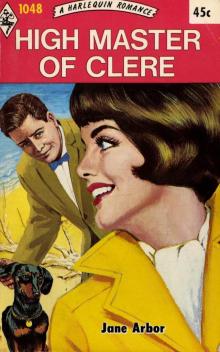 High Master of Clere
High Master of Clere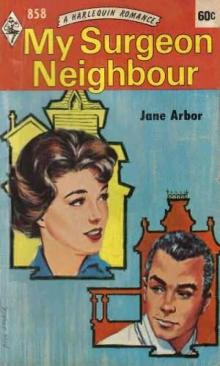 My Surgeon Neighbour
My Surgeon Neighbour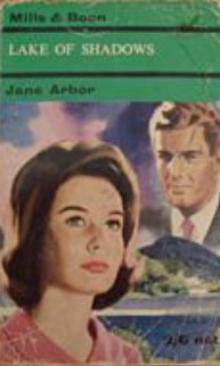 Lake of Shadows
Lake of Shadows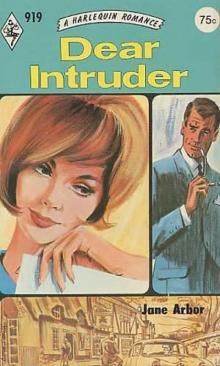 Dear Intruder
Dear Intruder Flash of Emerald
Flash of Emerald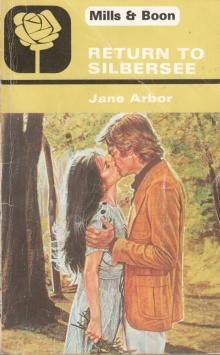 Return to Silbersee
Return to Silbersee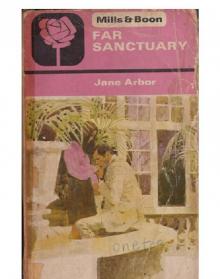 Far Sanctuary
Far Sanctuary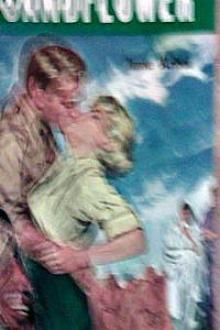 Sandflower
Sandflower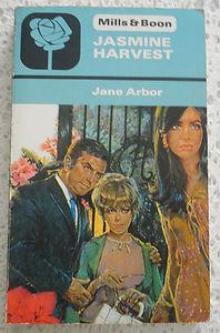 Jasmine Harvest
Jasmine Harvest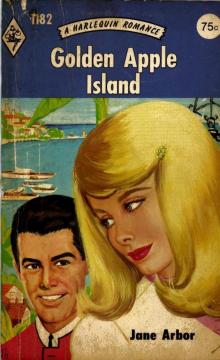 Golden Apple Island
Golden Apple Island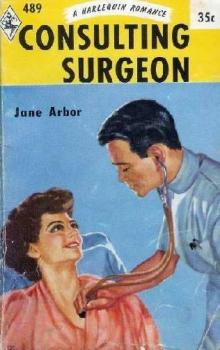 Consulting Surgeon
Consulting Surgeon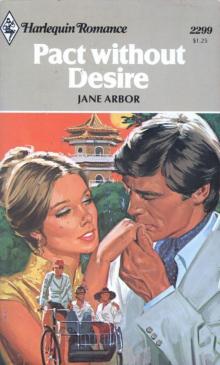 Pact without desire
Pact without desire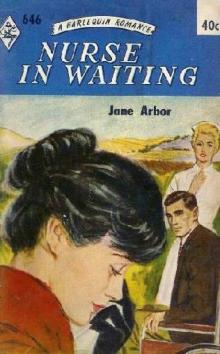 Nurse in Waiting
Nurse in Waiting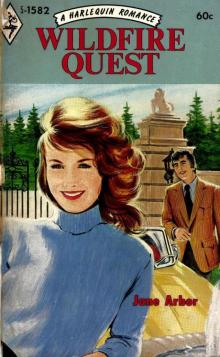 Wildfire Quest
Wildfire Quest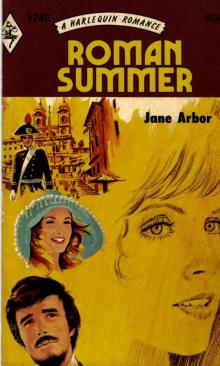 Roman Summer
Roman Summer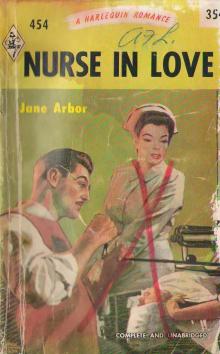 Nurse in Love
Nurse in Love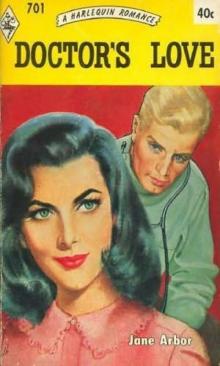 Doctor's Love
Doctor's Love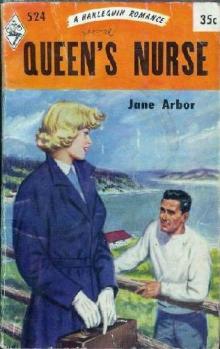 Queen's Nurse
Queen's Nurse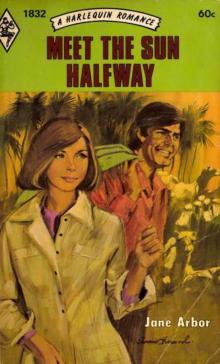 Meet the Sun Halfway
Meet the Sun Halfway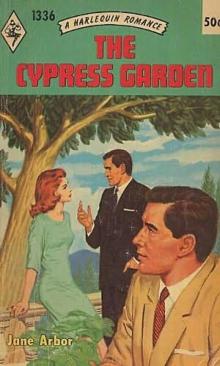 The Cypress Garden
The Cypress Garden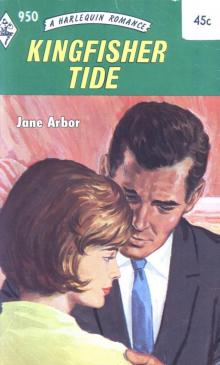 Kingfisher Tide
Kingfisher Tide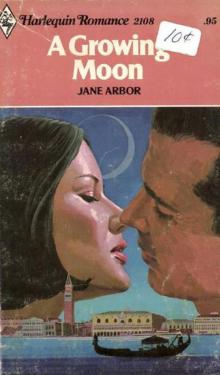 A Growing Moon
A Growing Moon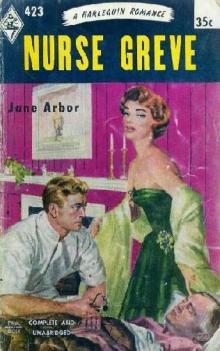 Nurse Greve
Nurse Greve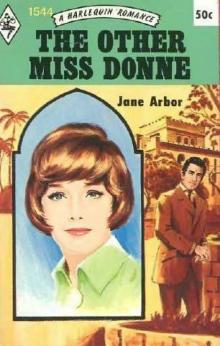 The Other Miss Donne
The Other Miss Donne